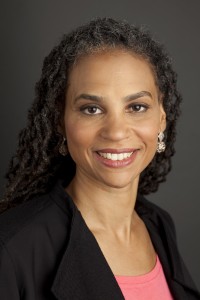On February 18, 2014, Mayor Bill de Blasio appointed Maya Wiley, a civil rights attorney and co-founder of the Center for Social Inclusion, as counsel to the mayor. In addition to serving in the traditional role of the counsel, Wiley will also focus on investing in the City’s technology infrastructure and expanding broadband access across the City.
Maya Wiley was born in Syracuse, New York, and raised in Washington, D.C. Her parents, active in the civil rights movement, had a profound impact on Wiley. Her father, an organic chemistry professor, later founded the National Welfare Rights Organization and was arrested multiple times in non-violent protests advocating for women on welfare. This exposed Wiley to the legal system at a young age. Wiley remembers a particular incident where her father was arrested along with other protesters and charged with a misdemeanor, but instead of being released right away, the judge held the protesters for hours, humiliating them in open court into the night. From these early experiences, Wiley learned that she wanted to commit to helping people.
Wiley graduated from Dartmouth College in three years with a degree in Psychology. After Dartmouth, Wiley worked as a paralegal for a year before attending Columbia Law School. She decided to go to law school after taking a course called Psychology and the Law. Wiley wanted to use her legal education to address issues arising from the intersection of race and poverty, and harbored an ambition to eventually work for the NAACP Legal Defense Fund after law school. She chose her law school accordingly. At Columbia Law School, Wiley became a protégé of Jack Greenberg, Vice Dean of the Law School, who had followed Thurgood Marshall as Director-Counsel to the NAACP Legal Defense Fund. As a law school summer Human Rights intern, Wiley worked in the Philippines where she witnessed the country’s transition to democracy and the way ethnic relations played out in a different country.
After law school Wiley clerked for the Honorable James T. Giles in the Eastern District of Pennsylvania. Judge Giles joined the chain of mentors and teachers who helped shaped Wiley’s career. After her two-year clerkship, Wiley received a fellowship working for the American Civil Liberties Union’s National Legal Department where she worked with the Director John Powell on race and poverty cases involving discrimination and quality education. Wiley then won a two year scholarship to work with the NAACP Legal Defense Fund’s Poverty and Justice Program, after which Wiley joined the United States Attorney’s Office for the Southern District as an Assistant United States Attorney in the Civil Division.
After three years at the Southern District, Wiley went to the Open Society Institute for what was supposed to be a six-month stint, but she stayed for three years. During her first year, she split her time between the general counsel’s office and U.S. programs. Over two years, Wiley helped develop a criminal justice initiative in South Africa. Wiley compares her time at the Open Society Institute to her current job as counsel to the mayor because both positions possess a legal component and a program development component. Upon her return from South Africa Wiley founded the Center for Social Inclusion, in addition to starting her family. The Center for Social Inclusion’s focus is on connecting with communities, particularly low income communities of color, with policy ideas to create more inclusion and opportunity for those in the community.
Twelve years after starting the Center, Mayor Bill de Blasio approached Wiley to join his administration. Wiley had always focused on policies, and never saw herself going into politics. Mayor de Blasio and Wiley had not previously met, but the two shared mutual friends, and de Blasio called her in for a meeting. Wiley went to the meeting thinking it would be nice to meet the mayor. She became intrigued by de Blasio’s approach to the counsel position because he wanted the counsel to advance the administration’s policy agenda in addition to traditional City Hall responsibilities.
One of Wiley’s first major projects as counsel will be to expand broadband access across the City. This initiative is a step to end inequality in the City by creating more economic opportunities for everyone, which today involves having reliable high speed Internet access. There is almost no social outcome that happens without high speed internet access, from parents monitoring their children’s school work online to running small businesses. Accordingly to Wiley, at least a third of people in the City are without access to high speed Internet. This presents a complex challenge which will necessitate a creative and multistep solution.
Wiley hopes to define the counsel position by demonstrating that lawyers can be important partners in developing policies that shape the City.
By: Elizabeth Osley (Elizabeth is a City Law Fellow and a New York Law School Graduate, Class of 2013).



Maya, enjoy your comments and knowledge of the law and politics.
I was elected in 1975 to Albany NY county legislature by defeating an incumbent republican, which was held by GOP for nearly fifty years.
Keep up the GREAT WORK.